🎤 TL;DR:
I participated in the Ultraspeaking course and it’s one of the most thoughtfully created and impactful courses I’ve ever taken. This post is an ode to Ultraspeaking.
Don’t take that corner too fast…
Don’t brake too hard…
That bridge is too narrow…
Watch out for those loose rocks…
You’re probably not going to make that drop…
Watch out for that bear…
As a completely novice mountain bike rider, most of my focus and attention during a ride is focused on not dying.
When you’re riding down a trail, you’re constantly discovering your own limits, both physically and pscyhologically.
You grip the hell out of the handlebars and hang on for dear life, praying that you can maneuver around trees, shrubs, boulders, rocks, and roots without flying over the handlebars, dropping over a cliff, or getting eaten by a bear (yes, we frequently see bears on our rides!).
One of the most interesting phenomena that I’ve discovered is that the moments when you most want to slow down or hesitate is exactly when you need to surrender.
It’s often the over-zealous braking that leads to injury. Going too slow, hesitating, and overthinking leads to instability, and it’s a lot harder to control your bike when it’s going slowly over bumpy terrain.
There’s a lot of trust and courage required.
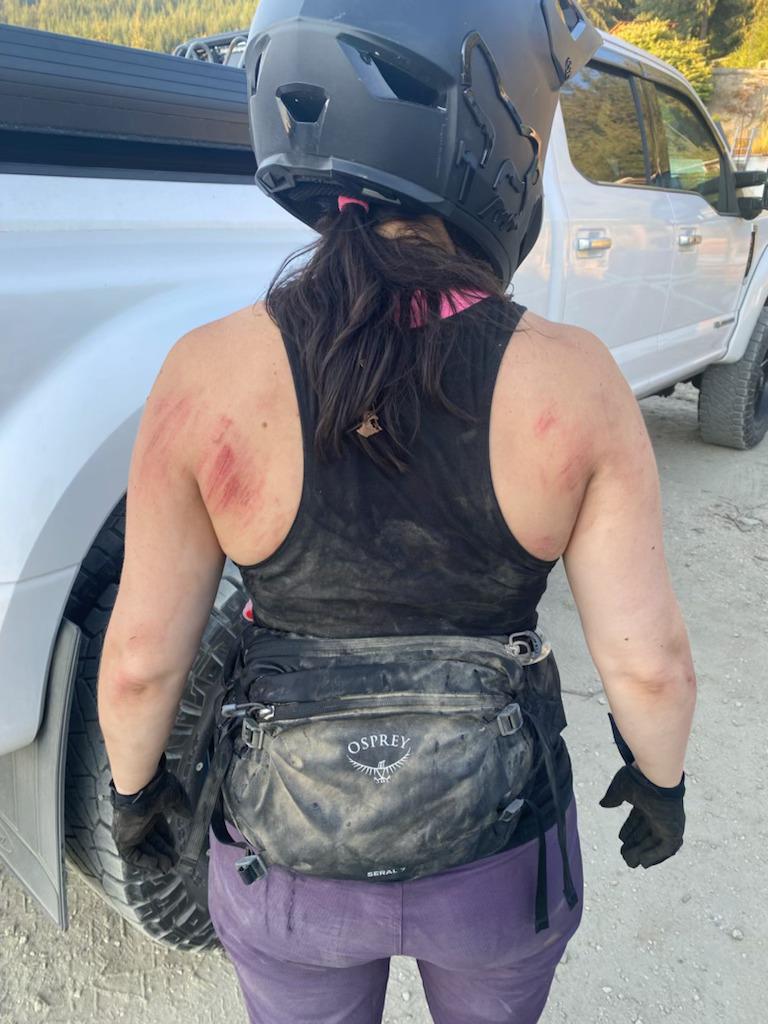
I had my first big wipeout at the local downhill park as I attempted Red Dragon, a red trail that was definitely above my ability, having only been mountain biking half a dozen times before.
Most of the trail was intimidating but doable, and my ass-over-tea-kettle moment happened pretty close to the bottom of the trail as I was braking too hard on some loose dusty rocks.
The red rating is for blood, right?
It hurt, but it was also pretty entertaining (for both myself and my compatriots), and I finished with one more ride on an easier blue trail before we wrapped it up for the day.
My friend said she was surprised I was willing to go downhill again for another ride; that I was brave.
Brave or stupid, I’m not always sure, but I thought to myself, this was my first major fall. I pushed up against my limits and found an edge to grow.
I needed more technical expertise. And the only way to get more technical expertise is to practice.
Every single time I put myself out there on the hill requires a hefty dose of courage.
I’m trusting my bike, the weather, nature, and my own skills and abilities.
On a late Thursday afternoon, I had just finished my final Ultraspeaking Zoom class. Ultraspeaking is an intimate online course experience aimed at helping you feel comfortable speaking in any situation.
It was bittersweet to say goodbye to both the coaches and the other participants in this small cohort.
I was hurriedly gathering my biking gear so my husband and I could dash out for an evening mountain bike ride before the sun went down.
My mind was racing as I was simultaneously processing the experience of the final class while also anctipating the trails we’d be exploring on this spectactularly sunny day.
After a gruelling ascent up old logging roads and winding trails, it was time to make our way down the mountain. It wasn’t take long before my mind transitioned from “just try to stay alive!” to thinking about courage. And before I knew it I was doing Ultraspeaking exercises in my mind as I was going down the trail.
“Ultraspeaking is like Mountain Biking because…”

One of the many games you play in Ultraspeaking is Rapid Fire Analogies, where a series of analogies appear on the screen and you have to finish the sentence in 5 seconds (or less) before the next one appears.
By the time you finish speaking the sentence out loud you essentially have a second to complete it. This exercise forces you to get out of your head and trust your brain’s ability to come up with an answer on the fly.
The game is designed to get you flustered.
Can you let go of the need to have a good/right answer?
Can you feel flustered but stay in character?
The key insight, of course, is that it matters less what you say than how you say it.
See the same in action:
Similarly you have games like Rapid Fire Autocomplete based on the same premise:
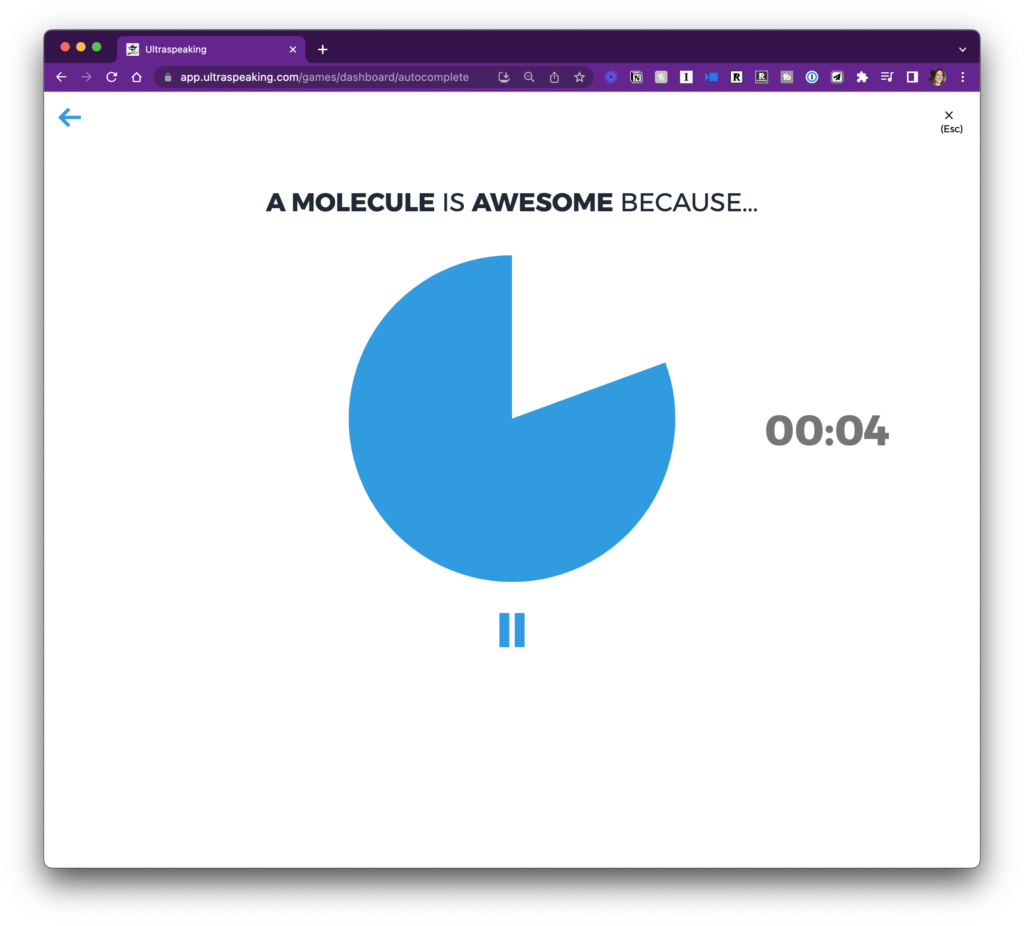
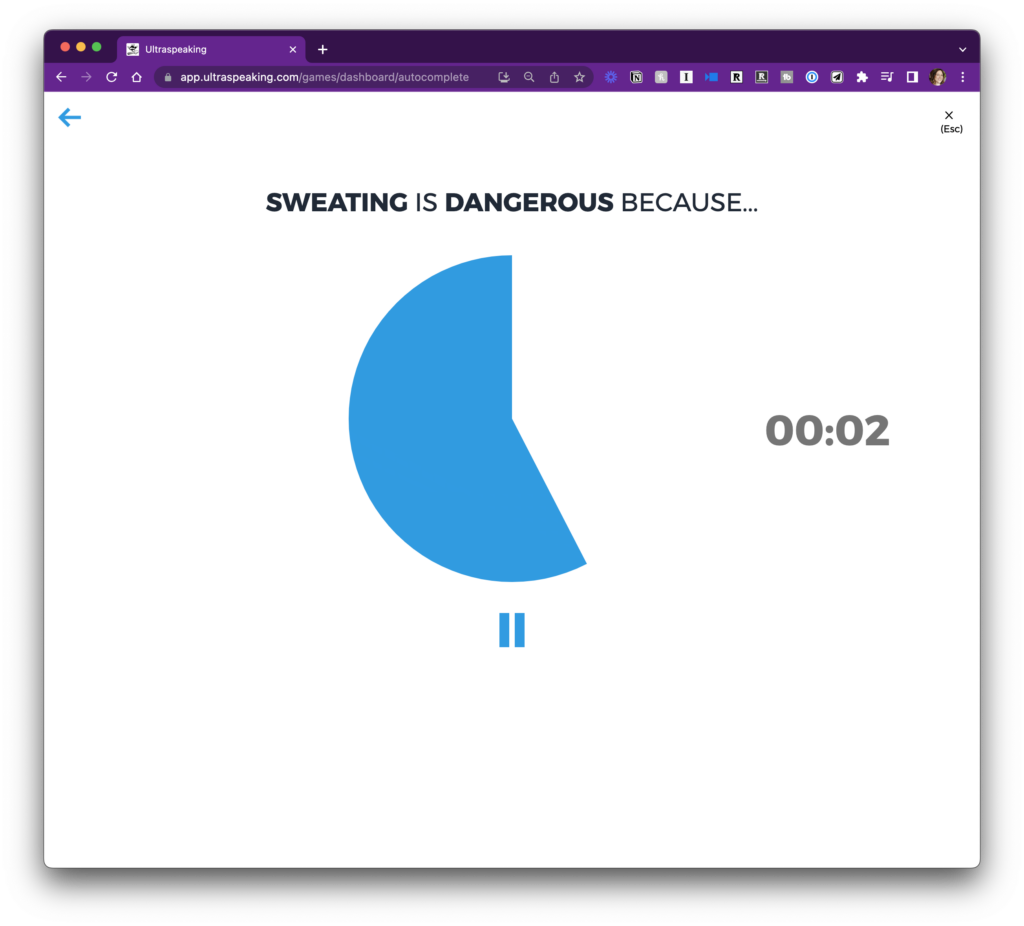
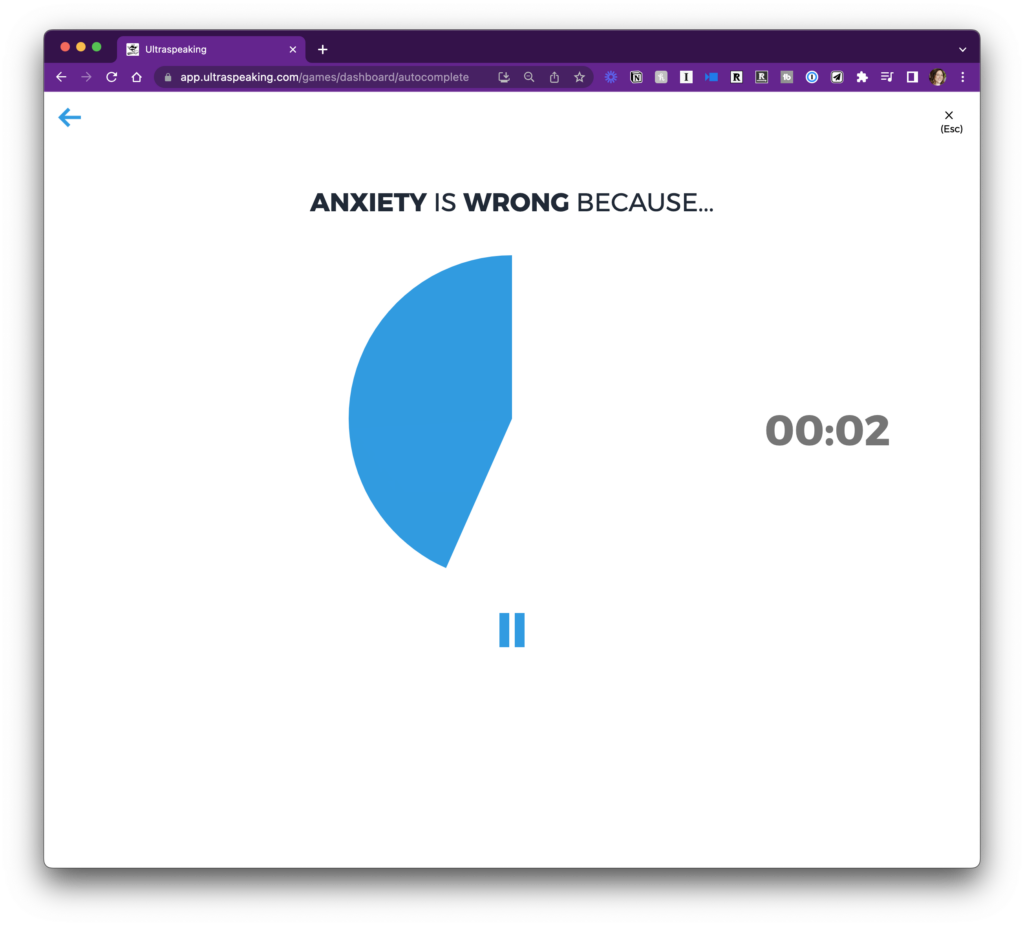
Here I was forming connections and playing Ultraspeaking games in my head while I was biking.
I’d heard my husband talk about this before—how he would be momentarily distracted and be solving problems in his head before remembering that he was biking and would refocus his attention on his surroundings. You might even call it flow state.
I previously wouldn’t have believed it was possible:
How could my attention be anywhere else except the path literally in front of me? Would I ever get experienced enough with mountain biking that my brain might actually wander elsewhere, outside of the thought “please don’t die”?
And here I was, my brain in flow, scheming up stories, connections, and analogies while doing an activity that was legitimately challenging.
I laughed to myself because Ultraspeaking really IS like Mountain Biking:
- Self trust is both required and deepened through practice.
- Both require courage. Courage to show up, and courage to continue even when you land on your ass.
- You’re going to make mistakes; mistakes are necessary for learning.
- Surrender leads to flow.
- Sometimes all you need is a good pause.
- Overthinking leads to pain.
- You only get better by doing it.
- Both make for good stories.
- It’s more fun to do with friends.
- You’ll meet amazing people in the process.
- Good mentors help you unlock new levels.

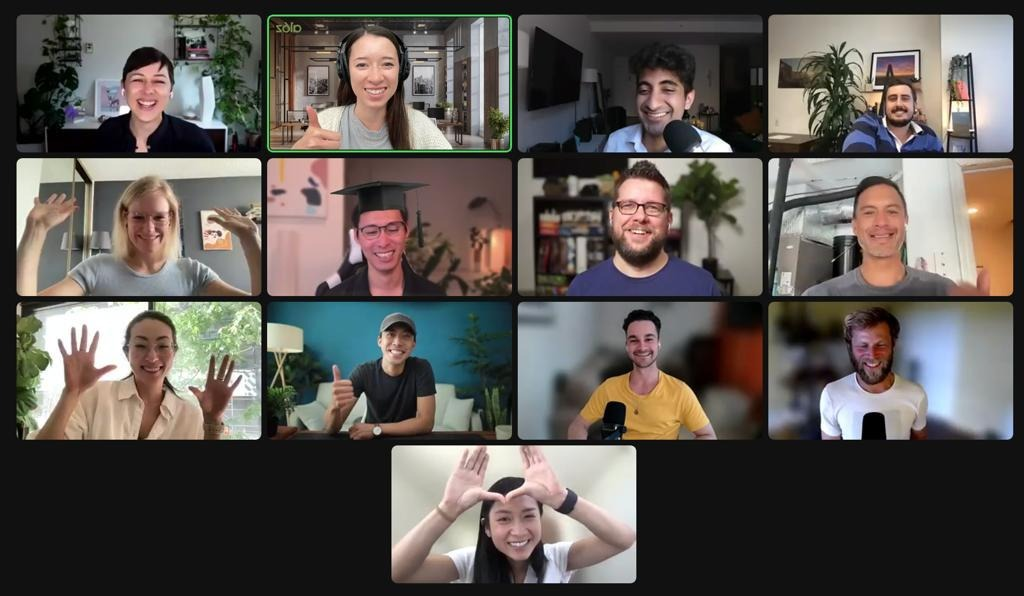
What the heck is Ultraspeaking?
What is Ultraspeaking, and what makes it different than other speaking-related learning experiences?

Utraspeaking is a small cohort-based learning experience that is designed to get you speaking effortlessly in any situation, not just “public speaking.” I’d argue that the course builds your inner wisdom and speaking confidence more than anything else.
What makes this course so wonderful and so unique? It’s baked into the DNA.
PREMISE
The premise and the DNA of the course is really about staying in character, being conversational in your style, and learning to trust your instincts. We all have the ability to speak, and we do it all the time with our family, friends, coworkers etc.
So why do we make it weird in a different context? Why do people put on “presenter voice”?
The idea is to get back to how we speak when we’re at our most comfortable (in character), and remaining that way regardless of our context and circumstances. Strip away the performance, and stay in character. Lean on your lived experience, stories, and perspectives just as you would in a conversation with friends.
FORMAT
The course is made up of lessons, games, and coaching in a small group environment, which allows for transformation to happen in real-time. The course takes place over several sessions each week over 5 weeks.
Cohorts are small, anywhere from 12-15 people, and exercises are done in even smaller breakout rooms of 3-4, so you’re not practicing with a huge room full of people.
The lessons and games are thoughtfully designed and super practical, and I believe the gamification of the learning is a huge part of why the experience feels enjoyable. Even when you feel challenged, you understand why and how the practices are designed to help you improve and can find enjoyment in it. It’s even fun watching your classmates do their rounds.
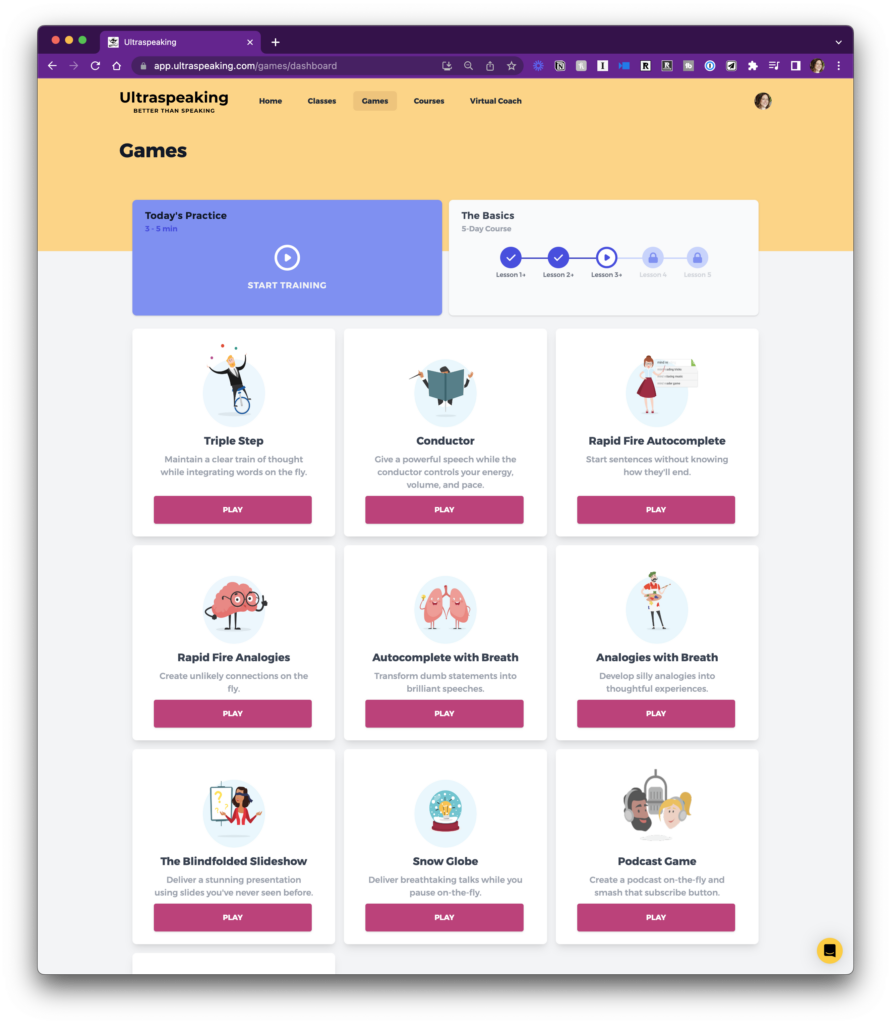
The coaches are exceptional at what they do. They know how to elicit feedback, deliver constructive criticism, and even let you fumble. We don’t want to fumble, yet the fumbling is part of how we can safely experience discomfort and know that we’re going to be ok.
There’s self reflection: “what did you like about that? how did that feel?” as well as participant reflection: “I loved the way you jumped into that story!” followed by suggestions for improvement, and encouraging you to try adding one or two elements of change.
It’s a space to play with different approaches, and get to know yourself and build trust in yourself in the process. It’s a powerful experience to have a word appear on the screen and not know how you’re going to fill 2 minutes of time, and then somehow manage to do it by surrendering to the process and trusting that you’ll figure it out.
Time and time again… it somehow works out that you figure it out (but only if you surrender!).
You practice pausing for uncomfortable lengths of time, varying your energy, telling stories in different ways, and speaking about randomly appearing topics in playful games.
There’s really no substitution for practicing speaking, but in this case you’re practicing while the stakes are low. You’re not developing a Ted Talk, you’re literally playing games with words and stories!
FOUNDERS
The program was developed by Tristan de Montebello and Michael Gendler, two high-vibe entrepreneurs who designed a program based on their passion for helping people develop their conversational speaking skills.
Their kindness, wisdom, and generous spirit comes through in every aspect of the course. These guys know how to hold space for others. They are both outstanding coaches that know how to give feedback and encouragement to help you build your confidence, and they’ve created a community of outstanding coaches who are equally skilled.
Watch Tristan and Michael compete on some of the exercises while in a sauna!
“Ultraspeaking gets you to spend less time preparing and more time in the moment”
I was really struck by this promise.
As an online teacher with ADHD, I’ve spent many years trying to standardize a preparation method for myself in order to feel comfortable delivering workshops and trainings.
Inevitably, no matter how much scripting I try to do, the moment it’s go time I’m unable to look at my notes without getting flustered. It only seems to work well when I know the key points I want to cover, but let my brain fill in the gaps.
I always judged myself for not being able to be one of those really “polished” and “prepared” folks who could follow a script and look really “pro.”
Suddenly I’m in a class where there is not only full permission to be completely unprepared and fully in the moment… but where preparation is actively discouraged!
It’s almost as though I’ve been fighting against all my natural instincts, thinking I needed to be someone different than I am.
What if I was onto something, and my ability to be present in the moment was not only professional but actually more engaging?
What if being “pro” isn’t being “polished”, but simply being even more genuine?
Why did I sign up for Ultraspeaking?
The Ultraspeaking website boasts:
“Actually look forward to presentations, Zoom meetings, and last minute wedding toasts.”
Ha ha, I thought. Looking forward to..? SURE.
I was skeptical about that part of the course promise. Skill improvement, sure. But actually enjoying speaking? Hrmmmmmm. Unlikely.
I’ve done a LOT of skill development around speaking. Being able to speak comfortably and confidently is something that has challenged me since childhood.
As a result, over the years I’ve invested in a variety of self improvement formats around helping build my comfort around speaking as a skill:
- Acting classes
- Speaking coaches
- Storytelling courses
- Speaking bootcamps
- Voice coach training
- Leadership coaching
- etc.
When I shared on twitter that I was blown away by this course, Vickey replied:
And this reply actually touches upon something really key from the course:
Discovering just how much of a gap there is between how others perceive us, and how we perceive ourselves.
I think we even know this instinctively, but it’s another thing to really experience it first-hand through the coaching and feedback from your Ultraspeaking participants.
You see someone speak for two minutes about a randomly presented topic and you think, daaaamn that was awesome! Then you hear what the speaker thought about their performance, and you realize just how skewed our own self perceptions are.
I’ve often been told I seem really comfortable when I’m speaking, and most folks wouldn’t have had any idea the stress I was feeling anytime I had to speak, or be the center of attention in a room.
If I had to give a talk or run a workshop, I wouldn’t sleep in the days before, and I would often replay cringey moments in my head for days (sometimes years) later.
In 2016 I signed up for the Supernaturally Shy Intro to Acting (a 6-week intro course) to help me work through my stage fright. The extreme tension and discomfort I felt had me both laughing and crying through most classes; I couldn’t regulate my nervous system and would jump from panic to excitement, to delirious laughter to emotional tears. I was all over the place!
One of my fellow students remarked that I was so good at crying. But my tears weren’t performance; they were simply an expression of my extreme discomfort and feeling like an open wound for 2.5hrs at a time.
Panic would highjack my brain and body, and it took every ounce of energy to keep myself from fleeing the room at any moment.
On the second day of this acting series our teacher dimmed the lights and casually informed us that we would each take turns coming up onto the brightly lit stage to “sing a few verses of a song that means something to you.”
Record scratch.
EXCUSE ME??
“So this is how I die,” I thought.
And if it sounds overly dramatic, it is. But in that moment, it was the most discomfort I’d ever felt. The “fight or flight” panic my body experienced is something I’ve only experienced a handful of times in my life, like a wave of poison coursing through my veins. I was sure the organs in my body were shutting down one by one.
My mind went blank; I couldn’t think of a single song that I could remember any lyrics to (outside of Happy Birthday)! My mind raced with competing thoughts: “the door is just over there on the left, I could run out the class now and never look back!! the lights are down, they’ll never know!” and “think of a song, think of a song, THINK OF A SONG!!”
I was too frozen to run to the door, and I still have no idea what part of me made it possible to walk up to the stage when it was my turn. Somehow my body made its way to the stage, as I fought back both the urge to vomit and the urge to run (is vomit a form of fight?).
I sat down on the tiny chair in the middle of the stage under a bright spotlight. I am Jack’s complete and utter anxiety.
I took a huge deep breath, and I sang the only song that I could think of in that moment that I knew I could remember the lyrics to.
I sang Weird Al’s Jurassic Park.
Let it sink in.
My fellow students all managed to sing something beautiful and meaningful, and here I was singing a parody song about dinosaurs.
When I got off the stage and sat down tears began rolling down my face because I just felt so deeply uncomfortable and silly. Adrenaline had flooded my system.
It’s the Supernaturally Shy Intro to Acting!? Wasn’t this supposed to be the slow, gentle mode?? How could she throw us into a swimming pool of sharks!?
If I had known we’d have to sing in front of other people I would never have signed up for this course in a million years!
But am I glad I did? Yes.
Much to my own surprise, I ended up signing up for continuing classes after that 6-week series ended, and I did weekly classes every week for a year. You could call it exposure therapy.
The teacher later told me she was surprised that I continued on. She thought I “threw the exercise away” as though I wasn’t taking it seriously. She had NO IDEA the depth of my fear and the anxiety I had of being on stage, let alone singing in front of strangers (the DNA of my nightmares).
When I didn’t die after that class, I thought to myself, well, it can’t possibly get more difficult than that (it did, but that’s a story for another day). Suddenly, speaking about something I care about seemed infinitely easier than singing alone on stage in front of strangers.
The fear of death transitioned into surrender.
Now, obviously all this panic and anxiety is not really about speaking. It’s about stored trauma in the body that signals to the brain, it’s not safe to be seen or noticed. It’s not safe to fail (or look stupid).
What Ultraspeaking does is provide a safe environment to be uncomfortable.
To be seen in all your discomfort and know that you’re fine— you’re actually better than fine, you’re doing great!
The small size of the group is a big part of this; it keeps the stakes really low.
The self-trust was the piece I was seeking most, and it was the piece this course over-delivered on despite my own skepticism.
I haven’t been incentivized to write this post, I’m just a legitimately impressed and satisfied student who believes that this program and its creators deserve more attention and love!
What am I taking away from the experience?
Embracing stories.
Often my workshops lean a little more technical and “how-to.” But even in more tactical workshops I realize just how much personal stories create engagement. I have more insight into how to weave in my personal stories in different ways to create more connection and engagement.
Practical Techniques.
I now have a toolkit of super practical techniques and activities I can rely on when I’m preparing for workshops that allow me to be more present and not worry about needing to be scripted.
Trusting myself.
I have a newfound trust in my ability to handle myself in speaking situations. I have seen first-hand my brain’s ability to get into flow. I trust that not only am I capable, but I’ll also enjoy myself! I don’t dread workshops anymore!
Ultraspeaking is one of the best courses I’ve ever taken.
And I’ve taken a lot of courses.
I cannot recommend it enough. I think it’s a course just about anyone can benefit from, because speaking is communication, and we all need to communicate every single day.
If you ever feel nervous on sales calls, awkward in social situations, want to feel more comfortable communicating with your team or even telling stories, or just want to feel comfortable in your own skin, sign up for Ultraspeaking.
You won’t regret it. https://ultraspeaking.com/fundamentals/



Leave a Reply